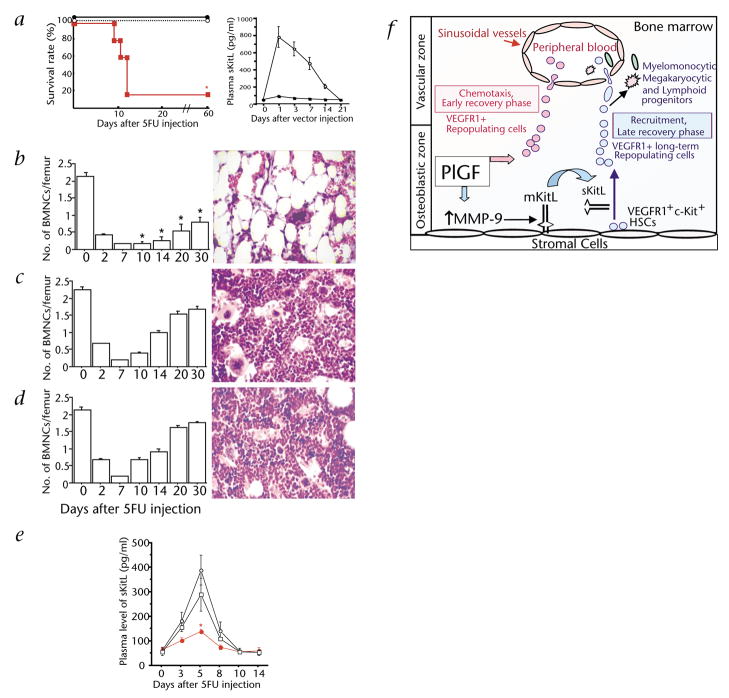Fig. 6.
Administration of sKitL restores impaired hematopoiesis in mice treated with 5FU and neutralizing anti-VEGFR1. a–d, BALB/c mice received a myeloablative dose of 5FU i.v. on day 0. Cohorts of 5FU-treated mice (n = 6 per group) were injected i.p. with neutralizing doses of anti-VEGFR1 or IgG (control) in 3-day intervals starting day 0. Mice were co-injected with AdsKitL or Ad-null vector on day 2. a, Left, Survival rates were monitored (n = 12; *, P < 0.001). ○, 5FU+IgG+AdsKitL; ●, 5FU+anti-VEGFR1+AdsKitL;  , 5FU+anti-VEGFR1. Right, Plasma levels of sKitL were determined by ELISA. ○, AdsKitL; ■, Ad-null. b–d, BMMCs were counted and H&E staining of femurs of anti-VEGFR1 (b), anti-VEGFR1+AdsKitL (c) and AdsKitL-treated (d) mice was performed for morphological analysis, magnification, ×400. *, P < 0.01 comparing the absolute number of BMMCs in the anti-VEGFR1 vs. the control groups. e, Plasma sKitL levels were measured by ELISA in 5FU-treated mice co-injected with neutralizing doses of mAb to VEGFR1 or IgG (n = 5; *, P < 0.01 comparing sKitL plasma levels in mice treated with anti-VEGFR1 to controls). ○, 5FU+IgG;
, 5FU+anti-VEGFR1. Right, Plasma levels of sKitL were determined by ELISA. ○, AdsKitL; ■, Ad-null. b–d, BMMCs were counted and H&E staining of femurs of anti-VEGFR1 (b), anti-VEGFR1+AdsKitL (c) and AdsKitL-treated (d) mice was performed for morphological analysis, magnification, ×400. *, P < 0.01 comparing the absolute number of BMMCs in the anti-VEGFR1 vs. the control groups. e, Plasma sKitL levels were measured by ELISA in 5FU-treated mice co-injected with neutralizing doses of mAb to VEGFR1 or IgG (n = 5; *, P < 0.01 comparing sKitL plasma levels in mice treated with anti-VEGFR1 to controls). ○, 5FU+IgG;  , 5FU+anti-VEGFR1; □, 5FU+anti-VEGFR2. f, PlGF mediates the early phase of BM recovery through rapid mobilization/chemotaxis of preexisting VEGFR1+ BM-repopulating cells. During the late phase of BM recovery PlGF promotes hematopoiesis primarily through MMP-9 mediated release of sKitL, resulting in enhanced cell motility, cycling and differentiation of VEGFR1+ long-term repopulating cells. Error bars represent mean ± s.e.m. for 2–-5 separate experiments (a–e).
, 5FU+anti-VEGFR1; □, 5FU+anti-VEGFR2. f, PlGF mediates the early phase of BM recovery through rapid mobilization/chemotaxis of preexisting VEGFR1+ BM-repopulating cells. During the late phase of BM recovery PlGF promotes hematopoiesis primarily through MMP-9 mediated release of sKitL, resulting in enhanced cell motility, cycling and differentiation of VEGFR1+ long-term repopulating cells. Error bars represent mean ± s.e.m. for 2–-5 separate experiments (a–e).

